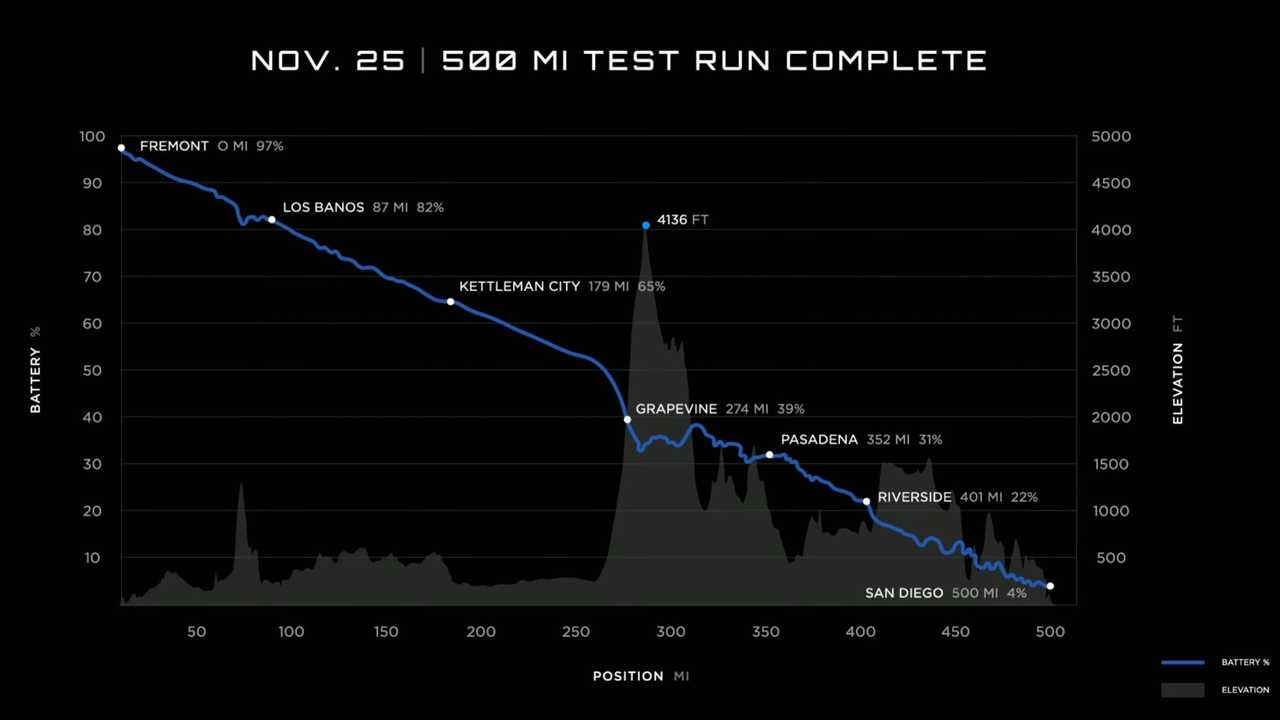The Tesla Semi Class 8 all-electric semi truck, in its top configuration, has a range of 500 miles (805 km) and energy consumption of less than 2 kWh/mile (1.24 kWh/km).
Those are the official numbers from the manufacturer, who is reluctant to reveal the battery pack capacity.
Combining the two values we can estimate that the estimated battery capacity is lower than 1,000 kWh (1 MWh). At least the usable value.
After the recent customer delivery event, Tesla CEO Elon Musk wrote on Twitter that the actual efficiency is even better than the official number from specs.
According to Elon Musk, the current number is 1.7 kWh/mile (1.06 kWh/km), with a “clear path” to 1.6 kWh/mile (0.99 kWh/km) and a possibility of 1.5 kWh/mile (0.93 kWh/km).
“Current efficiency is 1.7kWh/mile, but there is a clear path to 1.6, possibly 1.5”
That’s interesting info, because it suggests that the Tesla Semi’s battery pack might be slightly smaller than we initially thought.
Assuming 1.7 kWh/mile and 500 miles of range, it might be just around 850 kWh.
On November 25, Tesla completed a test run of a fully loaded Semi, which covered 500 miles from Fremont to Sand Diego, without charging along the way.
The achievement is impressive considering that the battery wasn’t fully depleted and that there was over 4,000 ft of elevation change (partially neutralized by the regenerative braking, but it’s always a negative factor).
According to the company’s graph, the Semi started at 97% state-of-charge (SOC) and covered 500 miles with 4% SOC left. That’s 93 percent points, which would indicate that the theoretical range during the test (100-0% SOC) would be 537.6 miles (865 km).
One SOC percent point would be worth about 5.4 miles (8.7 km) of driving.
If we now use Elon Musk’s info about 1.7 kWh/mile, it will turn out that the battery capacity would be about 914 kWh (plus a potential inaccessible buffer).

Tesla Semi: 500 mi test run
If the efficiency can be improved to 1.6 kWh/mile, the Tesla Semi would need only 800 kWh to drive 500 miles. At the theoretical 1.5 kWh/mile, it would be 750 kWh.
According to specs, the Tesla Semi will be able to fast charge up to 70% of its battery capacity in 30 minutes.
The company does not say that it’s from the 0% SOC, and we guess that rarely it will be charging from near zero SOC.
Assuming 1,000 kWh battery, it would require 1.4 MW of consistent power for 30 minutes to go from 0 to 70% SOC. At 900 kWh, it would be 1.26 MW and if the vehicle would start at 10% SOC, then it would be 1.08 MW.
That sounds close to the recently announced 1+ MW fast charging using V4 charging cable. This is why we are starting to think that the battery capacity must be really somewhere closer to 900 kWh, rather than full 1 MWh.
One of the key elements to make the Tesla Semi very efficient is aerodynamic shape, significantly different from the conventional diesel semi trucks.


But let’s not forget that Tesla introduced also a new tri-motor system with only one motor constantly engaged to wheels and a new 1,000 V powertrain.
Tesla Semi specs (2022):
- Fully loaded at 82,000 lbs (37,195 kg) Gross Combination Weight
- Range: about 300 miles (483 km) or 500 miles (804 km)
(two battery options) - Energy Consumption: less than 2 kWh/mile (1.24 kWh/km)
- Estimated battery capacity (based on range and energy consumption): lower than 600 kWh or 1,000 kWh (1 MWh)
- Acceleration 0-60 mph (96.5 km/h): 20 seconds (when fully loaded)
- Speed up a 5% Grade: Highway speed limit
- Powertrain: 3 independent motors (vs. four motors in the initial specs in 2017)
– two electric motors for acceleration at the rear axle (with automatic disengage)
– one electric motor for highway driving at the second axle (constantly engaged)
– carbon-sleeved rotors just like Plaid - Fast Charging: up to 70% of range in 30 minutes
Peak output: 1+ MW - Fuel Savings (est.): up to $200,000 over 3 years
Initial prices (at unveiling in 2017):
- Expected Base Price (300 mile range) – $150,000
- Expected Base Price (500 mile range) – $180,000
- Base Reservation – $20,000
- Expected Founders Series Price – $200,000
- Founders Series Reservation – $200,000
* Prices displayed in USD. International pricing will vary.

